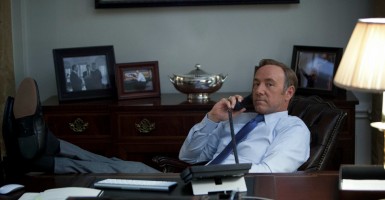You may not own a dog-eared, underlined copy of Machiavelli’s “The Prince,” but if you’ve been watching Netflix’s political drama “House of Cards,” believe me — you don’t have to. It’s a crash course in how to lie, cheat and steal your way to the top.
And I do mean the top. By the end of Season 2, Kevin Spacey’s Frank Underwood had managed (spoiler alert) to claw, connive and conspire his way from majority whip to the Oval Office. Now Season 3 of the binge-worthy series is available, giving us a chance to see what happens when ruthless ambition and ultimate power intersect.
And if that sounds a little bit like a press release, well, let me stop you right there. I don’t know about other viewers, but I actually feel somewhat ambivalent about the fact that as soon as one “chapter” ends, I’m ready to start the next one right away.
That unease is no accident. No one is touting Underwood as a role model. How could they? There’s nothing he won’t stoop to, including murder, to achieve his ends. His ability to do it with a smile and a handshake only makes it worse.
But the fact remains that, even as we shake our heads at his lawless pursuit, we wind up admiring his steely efficiency. We marvel at his audacious lies, but the fact that he’s already told us how he really feels (with occasional, break-the-fourth-wall asides to the camera) makes us almost vaguely forgiving. After all, he’s taken us into his confidence.
Naturally, his path to power has its share of impediments. Among those making it difficult for him are certain journalists who try to steer that tricky ground between being used and getting a scoop. And when they try to expose the troubling details of Underwood’s ascent, the echo of “All the President’s Men” is unmistakable.
And yet — more ambivalence — we’re on the other side now. Underwood has weaved his web so expertly that we find ourselves rooting against their efforts to unravel it. I felt a sense of relief, for example, when Lucas Goodwin was arrested, halting his quixotic attempt to prove that Underwood was guilty of murdering Zoe Barnes.
Such is the state of television (or at least a good portion of it) in 2015. The shows of yesteryear, with square-jawed good guys and beady-eyed bad guys, may strike some as too simplistic. But the pendulum has swung so far in the other direction, we’re almost in a different universe.
Perhaps it’s inevitable, when everyone appears morally compromised, that we end up cheering (albeit tacitly) for the Frank Underwoods of the world. Maybe a cold-blooded dedication to personal advancement is the only virtue left for us to latch onto, and our only “heroes” are those who are good at being bad.
Which is where Spacey’s character excels. He’s nearly always half a dozen chess moves ahead of the competition. Even when he’s thrown for a loop, he recovers so quickly and so expertly that he winds up eliciting our sympathy.
“Everyone sees what you seem to be,” Machiavelli writes. “Few know what you really are, and those few do not dare take a stand against the general opinion.” In time, Underwood may well be undone. The question is, will we cheer his demise? Or regret it?



























